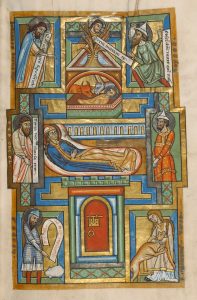“Show us, Lord, your mercy, cloaked in our misery and working the cure of the miserable by a new kind mercy drawn from our very misery. For this, the art of mercy, has blended God’s beatitude and man’s misery in making them one in the Mediator, that by dint of the mystery of this unity, in virtue of the resurrection, beatitude may absorb misery, life swallow up death and the whole man pass glorified into fellowship with the divine nature. The divine dignity accepted all the weakness of the flesh to which human nature because of its guilt is subject, without of course the guilt.”*
Guerric of Igny, a Cistercian abbot in the twelfth century, wrote this sermon for Christmas based on Isaiah 9:6, “Unto us a child is born,” a common verse associated with the Christmas liturgy. The Lord cloaked his mercy in misery when he took on human flesh and blood and became a Man, a human being, THE Human Being. For medieval Christians, only a man descended from Adam could pay the debt for Adam’s original sin and a man could only be born of a woman. To mediate between God and Miserable Man, God became a Human Being through a miraculous conception, but natural gestation and birth. Guerric explained later in the sermon: 
“It was not enough for [Jesus] that he should become less than angels by assuming mortal nature; he would become less even than grown men by adopting the state of helpless infancy. Let the holy and the humble see this then and glory in it, while the wicked and proud see it and confounded. Let them, I say, see the great God made a tiny child to be worshipped: an amazing mystery, the redemption of the holy and the glory of the humble, the judgment of the wicked and the ruin of the proud.”**
*Guerric of Igny, “Sermon 6: The First Sermon for Christmas,” Guerric of Igny: Liturgical Sermons, translated by the Monks of Mount Saint Bernard Abbey. Kalamazoo: Cistercian 1970, pp. 37-38.
**Ibid., 39.
